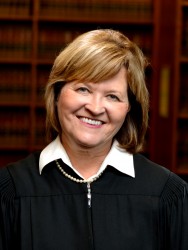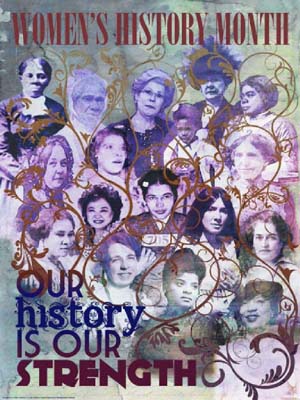.png)

Photo Credit: Getty Images
Breaking Through the Glass Ceiling
In 2012, the Tennessee Bar Association appointed a Special Committee to review the issue of the Glass Ceiling as it existed in Tennessee and to suggest best practices and practical suggestions geared toward advancing females in all types of legal practice environments. This Special Committee, chaired by the Honorable Deborah C. Stevens, was comprised of a team of attorneys from across the state practicing in a variety of legal positions, including TLAW’s then-President, Wynne Caffey. In an effort to gather information for the benefit of the initiative, TLAW conducted focus groups across the State to help analyze the barriers that women face and to identify practical solutions to those barriers.
The information gathered by the TLAW focus groups was incorporated into the final TBA report, Beyond the Glass Ceiling, which you can read online here. You can also read the results of the TLAW focus groups, which TLAW has published with permission from the participants.
This page serves as a place where TLAW continues to share news and information about professional development and progress for women in the legal field and beyond.
TN Courts Lack Diversity
Courts faulted for lack of diversity POSTED 7/16/16
By Stacey Barchenger
NASHVILLE — Tennessee judges are among the least diverse in the nation, according to a national study co-authored by a Va nderbilt University Law School professor and released last week.
“Judges are better able to understand and evaluate issues when they have experience and background that gives them insight to those issues,” Vanderbilt law professor Tracey George said. “Thus, we want judges who have a range of professional experiences and personal attributes.
“Externally, we would expect people to have greater faith in courts, which reflect the community which it serves.”
The study was done by George and Albert Yoon of the University of Toronto and released Wednesday by the American Constitution Society for Law and Policy. George and Yoon surveyed biographical information for more than 10,000 judges as of December 2014. The estimates in their study compare minority and gender representation on the bench to overall population.
Tennessee received an F grade and ranked 45th among states. Most states did poorly when ranked by representation on the bench compared to population: 41 received a D or F grade.
“I strongly support greater diversity in the judiciary and believe the face of our judiciary should reflect the diversity in our state,” TennesseeSupreme Court Chief Justice Sharon G. Lee said.
She said her own experience and statistical data show it is harder for women and minorities to win judicial elections.
“However, to be fair, the disparity between the percentage of women judges and the percentage of women in the general population does not tell the entire story,” Lee said.
Of lawyers who are members of the statewide Tennessee Bar Association, Lee said about 26 percent are women. The study found 20 percent of judges in Tennessee were women.
“Thus, the percentage of women judges is not out of line with the percentage of women lawyers,” she said. “Our focus should be on increasing the poolof competent and qualified minority and women lawyers and judges. As attorneys and judges, we all need to work harder to develop a more diverse base to improve our system.”
The study included appeals judges but excluded 33 Criminal Court judges and 34 Chancery Court judges in the Volunteer State. In some judicial districts, including Nashville, designated Criminal Court judges handle only serious criminal cases. Elsewhere, Circuit Court judges — who were included in the study — handle serious crimes. Chancery judges handle business, civil and contract disputes, among other things.
George cited the controversial six-month sentence handed down to Stanford University swimmerBrock Turner in a sexual assault case as an example of the consequences of judges’ decisions.
“A state court judge, who was also a Stanford graduate and a former athlete at Stanford, decided the student should not receive the standard two-year penalty set by the state Legislature in California as the minimum sentence for that crime,” she said.
George said that decision not only affected the victim and Turner, but could set precedent that other college students in similar cases may not be held to the two-year sentence.
The study’s authors plan to next examine the rulings of the judges for signs of influence connected to race, gender and ethnicity.
For more information regarding the glass ceiling, please enjoy the links, articles, reports, and websites below:
Women lawyers at Wall Street firms are rarely partners, study finds
Review Shows Tennessee Legislature Below Average in Women Participation by Tom Humphrey
For the full report by the National COnference for State Legislature, visit this site: http://www.ncsl.org/legislators-staff/legislators/womens-legislative-network/women-in-state-legislatures-for-2015.aspx
Who Needs Women's Leadership Programmes Anyway? by Angela Peacock

Organizations Working to Break the Glass Ceiling by Shellie Handelsman
Take the time to read this article written by TLAW member and practicing attorney, Shellie Handelsman, when she was a law student in 2014. Organizations Working to Break the Glass Ceiling.pdf

Pennsylvania Bar Association: Commission on Women in the Profession Release the 20th Annual Report Card
Check out the statistics and the progress that the Commission noted in Pennsylvania. https://www.pabar.org/pdf/PBAWIPReportCard2015.pdf
Votes for Women: Tennessee Lawyers vs. the Suffragists
TLAW Member, Wanda Sobieski, wrote an educational and historical article regarding the womens suffrage movement in the nation and how it was met with resistance by Tennessee lawyers and judges. Check out her full story here: http://www.tba.org/journal/votes-for-women
Chief Justice of the Tennessee Supreme Court Sharon Lee Sees Progress Made in Advancement of Women in Legal Profession, Stresses Need for More
 Recently TLAW Member and Chief Justice of the Tennessee Supreme Court, Sharon Lee, delivered a speech at the East Tennessee Lawyers' Association for Women Annual Supreme Court Luncheon regarding the advancement of women in the legal profession. After her speech, she released for publication her notes and remarks for publication. Take the time to read Chief Justice Lee's remarks regarding the advancement of women and her call for action to keep pushing forward.
Recently TLAW Member and Chief Justice of the Tennessee Supreme Court, Sharon Lee, delivered a speech at the East Tennessee Lawyers' Association for Women Annual Supreme Court Luncheon regarding the advancement of women in the legal profession. After her speech, she released for publication her notes and remarks for publication. Take the time to read Chief Justice Lee's remarks regarding the advancement of women and her call for action to keep pushing forward.
The First of Many: Justice Martha Craig Daughtrey
Justice Daughtrey was the first woman to serve as assistant U.S. attorney in the Middle District of Tennessee, the first woman to teach on the Vanderbilt Law School faculty, and the first woman to serve on the Tennessee Supreme Court. On her accomplishments, she stated, "I kept getting knocked down, but the whole idea was to stand back up." She recalled that being appointed and then later elected to the Tennessee Supreme Court "was like 'kicking sand in the face of the good ol' boys . . . and bringing cheer to the women.'" Check out this inspiring article from The Tennessean about Justice Daughtrey, a trailblazer for women. http://www.tennessean.com/story/news/2015/03/26/tennessee-judge-epic-firsts/70462294/
Women's History Month: Learn About City's First Women Lawyers

New project rewrites SCOTUS opinions from a feminist perspective
http://www.abajournal.com/magazine/article/new_project_rewrites_scotus_opinions_from_a_feminist_perspective

"Speaking While Female" http://www.nytimes.com/2015/01/11/opinion/sunday/speaking-while-female.html?smid=tw-nytopinion&_r=0 (Jan. 2015)

"Rethink What You 'Know' About High-Achieving Women" https://hbr.org/2014/12/rethink-what-you-know-about-high-achieving-women?utm_campaign=Socialflow&utm_source=Socialflow&utm_medium=Tweet (Dec. 2014).

http://www.americanbar.org/news/abanews/aba-news-archives/2014/10/major_new_researchs.html

"The Motherhood Penalty vs. the Fatherhood Bonus: A Child Helps Your Career, if You're a Man"

The American Bar Association Gender Equity Task Force
http://www.americanbar.org/groups/women/gender_equity_task_force.html
Large law firms are failing women lawyers
ABA's Grit Project aims to help women in advance in the profession